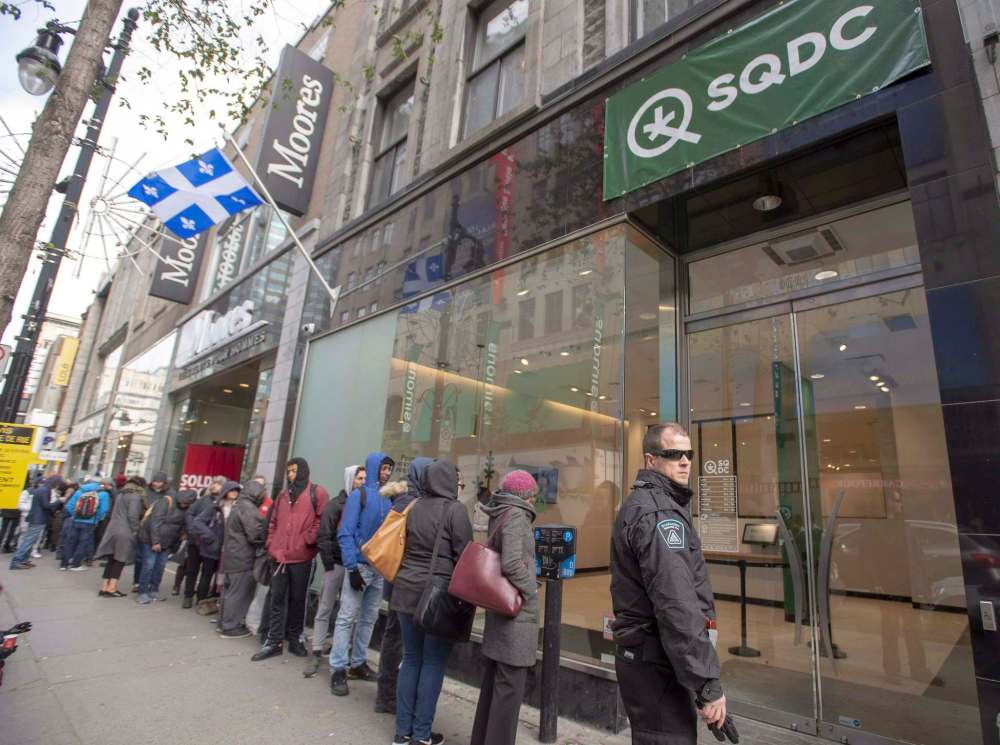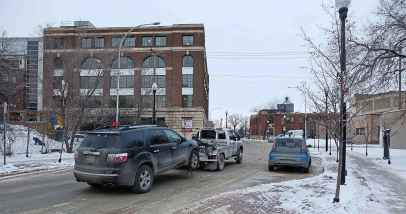Raising legal age to buy cannabis in Quebec wrong move, say experts
Read this article for free:
or
Already have an account? Log in here »
To continue reading, please subscribe:
Monthly Digital Subscription
$1 per week for 24 weeks*
- Enjoy unlimited reading on winnipegfreepress.com
- Read the E-Edition, our digital replica newspaper
- Access News Break, our award-winning app
- Play interactive puzzles
*Billed as $4 plus GST every four weeks. Offer only available to new and qualified returning subscribers. Cancel any time.
Read unlimited articles for free today:
or
Already have an account? Log in here »
Hey there, time traveller!
This article was published 06/12/2018 (2280 days ago), so information in it may no longer be current.
The Quebec government’s plan to raise the legal age for using cannabis to 21 from 18 is drawing the ire of some public-health experts, who say the move will backfire.
The legislation introduced Wednesday morning is just the second bill from the new Coalition Avenir Québec government, which decimated the Liberals in the province’s October general election.
Raising the age for cannabis was part of the CAQ’s campaign platform, but the new bill goes further than that. It will also prohibit the possession of marijuana on university and college campuses (with an exception for university residences), ban Quebec’s government-owned Société québécoise du cannabis stores from opening within 250 metres of those campuses, and add new prohibitions on where cannabis can be used.

On Wednesday, Quebec Premier François Legault implored young people not to use cannabis, saying in French the drug is dangerous.
But raising the age to legally use marijuana to 21 could also expose young Quebecers to risks, said addictions researcher Jean-Sébastien Fallu, an associate professor at the University of Montreal’s school of psychoeducation.
Cannabis is popular among young people, and the now-defunct federal prohibition against it never stopped them from using marijuana, he said.
“And if prohibition did not prevent them to use, I don’t think that raising the age will,” Fallu said.
Instead, he expects those young cannabis users to go back to accessing the drug from illicit sources.
“That’s a problem because we know that there can be pesticides that are bad for the brain, (and) there can be also all sorts of THC levels on the black market,” he said, referring to marijuana’s main intoxicating ingredient.
Fallu is also concerned that an 18-year-old Quebecer won’t be able to legally use cannabis, but will be allowed to use another risky drug — alcohol.
“There’s no scientific grounds to do that,” he said. “It’s illogical.”
Using cannabis does carry a possible risk to mental health, Fallu added, but “you cannot just do health policy based on one potential consequence.”

The federal law that legalized cannabis on Oct. 17 set the minimum age to use the drug at 18, but let provincial and territorial governments increase it as they saw fit. If Quebec passes the new law — which seems inevitable, given the CAQ’s majority in the provincial legislature — it will be the only second jurisdiction in Canada where the age of majority for alcohol is out of sync with the age for cannabis. (Manitobans can legally tipple on their 18th birthday, but must wait another year to use cannabis.)
Quebec native Kira London-Nadeau chairs the national board of the drug policy reform group Canadian Students for Sensible Drug Policy. Even though the CAQ campaigned on its cannabis age increase, the McGill University graduate student said she’s startled that the government is actually going through with it.
“I must say, I am surprised at the really flagrant disregard for scientific evidence and the professional recommendations of a number of experts on this file,” said London-Nadeau, citing a recent open letter signed by 10 public-health experts, including Fallu, that argued against the age increase. (The new bill does have the support of Quebec’s professional psychiatric association.)
Enacting a new prohibition for younger cannabis users could put them at risk by driving them to the illicit market, said London-Nadeau.
“(Quebec has) created a whole infrastructure that is safer and more reliable for people who are over 21, yet (this law will) leave that age bracket of 18 to 20 to continue with this alternative that isn’t as safe,” she said.
Surveys and polls consistently find Quebecers use cannabis less than Canadians in other provinces, and London-Nadeau said she often encounters stigmatizing language used to describe the drug in Quebec’s French- and English-language press.
The CAQ’s supporters in rural and suburban Quebec likely have more negative perceptions of cannabis, suggested former journalist Graham Fraser, now a visiting professor at the McGill Institute For the Study of Canada.
“It’s less likely to be seen as a benevolent pastime and more likely to be seen as dangerous,” he said.

That stigma is rooted in a prevailing public perception in Quebec that marijuana is inextricably linked with organized crime, said Fraser.
But Quebecers are definitely aware of the theory that organized crime could actually benefit from the province’s impending marijuana age increase.
An editorial cartoon published Thursday in the Journal de Montréal depicts a young man being turned away from a legal cannabis store. Around the corner, a gangster in a leather motorcycle vest pops a bottle of bubbly as he thanks Premier François Legault, and suggests Legault should do the same thing for alcohol.
solomon.israel@theleafnews.com
Twitter: @sol_israel








